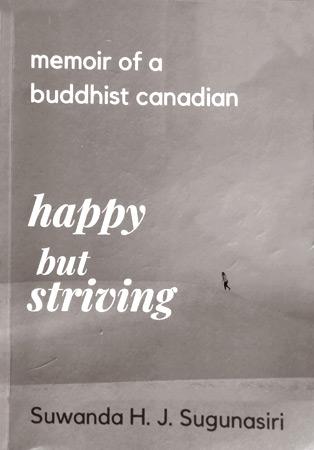
Published by Mosaic Press
Writer Dr. Suwanda H. J. Sugunasiri
It’s a very well written Memoir. It is a Memoir beyond the spirits of an arch-typical autobiography. It is academic. It’s ceremonial, morally and devotedly nationalistic. For which country? Not to the country he was born but solely as a soul staggeringly to Canada. It is because he was nurtured reservedly with profundity, savouring determinedly.
He had dwelled in three countries, originally by birth, Sri Lanka, academically pre-inducted United States, and finally dogmatically and exceptionally Canada in which he and his family are genuine citizens. By his Memoir, it is more open that he is proud and is in obeisance being a part of the citizenry of Canada. He functions consistently for the betterment of Canadian nation circumstantially. Clearly he has no intentions of leaving Canada any day to his original country like most of the other immigrants vie in mind.
The most pugnacious and exceptional element of the Memoir is that the author unpretentiously establishes his bonding to Canada by being an authenticated citizen. This he does by becoming an active member in the community working as a part of the country. His work is genuine and highly moral. It is greatly appreciable and empathetic.
Societal togetherness
Paramount significant element of his Memoir is what it signifies. It is none but his opportune services for the betterment of the nation, Canada. They are conducive activities concreting unity of the societal togetherness. He does this winning the hearts of the community through moral nurture. This is evident by his mechanism of bringing Buddhism into focus. He organises it an educational power.
He embarks on founding it in the University of Toronto where he is a teaching Professor. Students find it a valuable course of study. Establishment of Nalanda College of Buddhist Studies is very prominent in his services. Many times he fought for the funding of it from the government. Yet he continued with its successful functionality with personal support he was able to gather.
Today, it is a strong and powerful Buddhist educational force in Canada. This is nothing but for Dr. Sugunasiri. Additionally his works in multiculturalism, interfaith philosophy and similar works of activities foster the community to be of togetherness. It is absolutely a moral decorous of society. His aptitude in Multiculturalism enabled it be incorporated into a Parliamentary Act in 1979.
Multiculturalism facilitated various immigrant communities to be bonded together and be a part of the bigger citizenry.
Canadian mass still is no doubt, a Christian entity, and very strong. It is here Dr. Sugunasiri gains the maximum through the interfaith communion concept application. He practically followed and pontificated harmony among all the faiths immensely. His Memoir depicts it throughout.
While reading the Memoir it became apparent that Dr. Sugunasiri was a genuine doer of getting things done for the benefit of the Canadian society and its moral uplift. He tapped the correct sources including the Government and its appropriate departments. This means that he has gained exactions mobilised into action. Memoir records that he was connected to the press thoroughly.
Moral and religious uplift
In Toronto Star, he was a columnist contributing in many aspects for the moral and religious uplift of the Canadians and particularly the immigrant citizenry. Societal dialogue he utilised was dominant. He has authored over 30 literary works plus three anthologies of poetry.
It is important as well that he glowingly exposes in the Memoir the quality of equanimity regarding the three countries he dwelt in. This fact is humanely appreciable.
Sugunasiri is happy throughout. All the photographs in the Memoir exhibit that he is in everything rounded by cheerfulness and his life is filled by it. This seems a quality that he has amassed by being a practising Buddhist. He is no longer Sugunasiri, but ven. Prof. Bhikkhu Mihita
As a Buddhist myself, I disliked a reference the author of the Memoir makes at a Multifaith Participation involvement in Buddhist Christian Dialogue and Buddhist-Jews Dialogue. This apparently I believe is in reference to the belief in God in Christianity. The title of the “presentation was under the title, “Be a Lamp Unto Yourself”. This I believe he does to bring everybody together.
The author in his brief talk said at the referred to Conference, “Buddha himself claimed to be merely one who maximised potential in each one of us, but with no divine intervention. He is superman only in that sense – more like Tarzen, the Wonder Woman, or Neil Armstrong, the first man on moon, each of whom can only be an embodiment of the maximisation of one’s potential. So, the Buddha, in exhorting us to be a lamp unto ourselves, is telling ourselves all equal; you have similar strengths; so work on them without waiting for others to do it for you”.
For me, the Buddha is incomparable.
